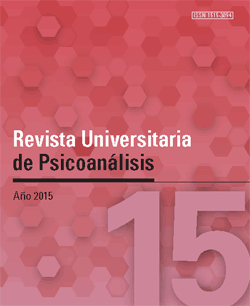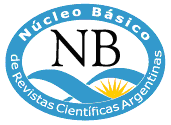Revista Universitaria de Psicoanálisis - Volumen XV

La identificación al rasgo unario y la constitución del sujeto.
The identification to the unitary trait and the constitution of the subject.
Autor/es: Ivon Haddad
RESUMEN
Palabras clave:
This paper’s main objective is to articulate the unary trait identification poses in Lacan Seminar 9, Identification (Lacan, 1961-1962 ) and the constitution of the subject.
First, we explore the concept of identification as the relation of the subject to the signifier. Secondly, we will address the passage of the concept of “unique feature \" Freudian teachings drawn from the concept of unary trait as a Lacanian invention. Also, explore the One who is involved in identification. At the same time, significant differences distinguish the pure, absolute or radical difference that reflects the unary trait. Also deploy some logical and philosophical references Lacan takes to support the identification opposes the classical idea of identity. In this sense, we distinguish first unary trait of the signifier and the sign and later differentiate the signifier and the One of identity. Finally, we will articulate the concept of unitary trait with the subject in psychoanalysis.
We are interested in realizing basically how through identifying the unary trait we can account for the constitution of the subject as the unary trait will notice the \"blurring\" of the object and therefore lack in being, as opening act. Critical issues to think the clinic because from this Lacanian reading, a failure to achieve unity or synthesis of subject and object of analysis it is found. As we shall see, the unary trait then implies not only the condition of the significant difference but also the condition of the rest of the identifications.
SUMMARY
El presente trabajo tiene como objetivo principal articular la identificación al rasgo unario que Lacan plantea en El Seminario. La Identificación (Lacan, 1961-1962) y la constitución del sujeto.
En primer lugar, exploraremos el concepto de identificación como la relación del sujeto al significante. En segundo lugar, abordaremos el pasaje del concepto de “rasgo único” extraído de las enseñanzas freudianas al concepto de rasgo unario como una invención lacaniana. También, exploraremos el Uno que está en juego en la identificación. Al mismo tiempo, distinguiremos la diferencia significante de la diferencia pura, absoluta o radical que da cuenta del rasgo unario. Desplegaremos además algunas referencias lógicas y filosóficas que toma Lacan para fundamentar que la identificación se opone a la idea clásica de identidad. En este mismo sentido, diferenciaremos primero al rasgo unario del significante y del signo y más tarde, el significante del Uno de la identidad. Para finalizar, articularemos el concepto de rasgo unario con el sujeto en psicoanálisis.
Nos interesa dar cuenta fundamentalmente cómo a través de la identificación al rasgo unario podemos dar cuenta de la constitución del sujeto en tanto el rasgo unario va a dar cuenta del “borramiento” del objeto y en consecuencia de la falta en ser, como acto inaugural. Cuestiones cruciales para pensar la clínica ya que, desde esta lectura lacaniana, se constata una imposibilidad de lograr la unidad o síntesis del sujeto como objetivo de un análisis. Como veremos, el rasgo unario implica entonces no solamente la condición de la diferencia significante sino también la condición del resto de las identificaciones.
Keywords:
Identificación - Rasgo unario - Sujeto - Identidad
Secretaría e Instituto de Investigaciones
Lavalle 2353
Tel/fax:4952 – 5481/ 4952 – 5490
Horario de atención: 10 a 17 hs
E-mail:
instinve@psi.uba.ar


